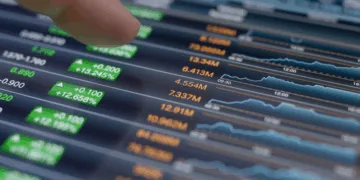Following the decision made by the US Federal Reserve, central banks of UAE and Bahrain also decided to lower the interest rates by 50 basis points.
Saudi Arabia’s central bank made an announcement that the benchmark interest rate of the kingdom which was held at 6% since last year July has now been reduced to 5.5% following a 50-basis-point cut.
Mirroring the move of the recent policy shift made by the US Federal Reserve which lowered the interest rates by the same amount earlier this week. The shift moved to a target range of 4.75% to 5%. It represents a pivot in monetary policy following two years of rate increases targeted at reducing inflation.
Gulf Cooperation Council central banks, notably Saudi Arabia, have followed suit because their currencies are connected to the US dollar.
The pressure on businesses and households is expected to reduce due to the lowered rates. The move can help with improving corporate cash flow, boosting domestic spending and existing loan facilities.
In a statement the central bank, also known as SAMA, said: “In line with its objective of preserving monetary stability, SAMA has decided to reduce the rate of Repurchase Agreement by 50 basis points to 5.50 percent, and the rate of Reverse Repurchase Agreement by 50 basis points to 5 percent.”
This has been known to be the first rate cuts in over four years which indicates progress on inflation and revelation of economic risks.
The policy shift has the potential to revitalize corporate activity and lending, notably in the real estate industry, which has already experienced significant expansion in Saudi Arabia.
GCC countries could leverage their resources and capital to drive internal growth as there is a transition in the global economics.
There arises a possibility for investment in infrastructure, innovation and technology with the lowered interest rates. These areas are critical to the long-term diversification goals under Saudi Vision 2030.
Aiming at reducing the dependency of the kingdom on oil revenues while also aiming to strengthen and maintain Saudi Arabia’s position as a the hub of innovation and sustainable development.
The corporate lending is known to be significantly impacted by the lowered rates. Saudi enterprises, particularly those in capital-intensive industries such as real estate, construction, and infrastructure, stand to gain from lower lending rates, allowing for more aggressive expansion and investment.
This is critical as the Kingdom continues to invest in large-scale projects like NEOM and the Red Sea Project, as well as other Vision 2030 initiatives.
The lowered rate cutes bring forward many opportunities and challenges for the Saudi banks. The rate cut opens ways to more borrowing and driving growth in lending portfolios. This may occur particularly in the real estate sector which experiences a rise in the demand for housing and is encouraged by a new age population and urbanization trends.
The lowered interest rates particularly make the mortgages and financing properties more affordable for consumers boosting the growth of the sector.
While a rate drop can encourage lending, it also reduces the profit margins banks get from loans. According to current SAMA data, banks made a record-high profit of SR7.83 billion ($2.1 billion) in July, a 23% rise year on year.
The Dubai-based asset and wealth manager also warned that the combination of rate reduction and sustained economic stimulus could result in inflationary pressures, particularly in the property sector, complicating Saudi Arabia’s economic environment.
Following the decision made by the US Federal Reserve, central banks of UAE and Bahrain also decided to lower the interest rates by 50 basis points.
Although a slightly different approach was opted by Qatar and cut their deposits, lending and repo rates by 55 basis points.
On the other hand Kuwait opted a more modest reduction and trimmed its discount rate by 25 basis points.
The GCC’s alignment is reflected in the coordinated moves with the global monetary trends while also keeping the balance with the local economic considerations.
When compared to the US, the GCC does not require high interest rates because of their relatively stable inflation rates which often stays at 2% or below.
As the US Federal Reserve begins its rate-cutting cycle, many economists believe it will benefit the Gulf area.
Lower interest rates in the United States can assist alleviate finance concerns, especially as the region’s oil price outlook weakens. Reduced interest rates in the Gulf can help to promote investment programs and reduce financial stresses caused by lower oil income, facilitating economic development and infrastructural projects.

















